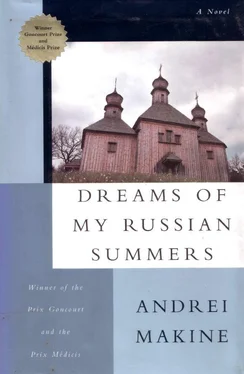It was then that this woman's isolation came into focus in all its shattering and mundane simplicity. "She has no one to talk to," I said to myself with stupefaction. "No one to talk to in French…" I suddenly understood what might be the significance for Charlotte of these few weeks that we spent together each summer. I understood that this French, this fabric of sentences that seemed so natural to me, would be frozen, when I left, for a whole year; replaced by Russian, by the rustling of pages, by silence. And I pictured Charlotte alone, walking along the dim streets of Saranza buried under the snow…
The next day I saw my grandmother talking to Gavrilych, the drunkard and scandalizer of our courtyard. The babushkas' bench was empty – the man's arrival must have driven them away. The children hid behind the poplar trees. The inhabitants at their windows watched the scene with interest: the strange Frenchwoman who dared to approach the monster. I thought again of my grandmother's isolation. I felt a pricking in my eyelids: "This is what her life is. This courtyard, this drunkard Gavrilych, this huge black izba across the yard. With all those families piled on top of one another…" Charlotte came in, a bit out of breath but smiling, her eyes veiled in tears of joy
"Do you know," she said to me in Russian, as if she had not had the time to switch from one language to the other, "Gavrilych has been talking to me about the war; he was defending Stalingrad on the same front as your father. He often speaks to me about it. He was describing a battle on the banks of the Volga. They were fighting to take a hill back from the Germans. He said he had never before seen such a chaos of tanks in flames, mangled corpses, bloody earth. That evening on the hilltop he was one of a dozen survivors. He went down to the Volga; he was dying of thirst. And there, on the shore, he saw the water, very calm, white sand, reeds, and young fish leaping as he approached. Just like the days of his childhood in his own village…"
I listened to her, and Russia, the country of her isolation, no longer seemed to me hostile to her "Frenchness." Touched, I said to myself that this big man, drunk, with his fierce gaze, this Gavrilych would not have dared to talk to anyone else about his feelings. They would have laughed in his face: Stalingrad, the war, and then all at once these reeds, and young fish! No one else in that courtyard would have even taken the trouble to listen to him: what can a drunkard tell you that is interesting? He had spoken to Charlotte. With confidence, with the certainty of being understood. This Frenchwoman was closer to him at that moment than all those people who were staring at him and counting on a free show. He had stared at them darkly, grumbling privately to himself, "There they all are, like in a circus…" All at once he had seen Charlotte crossing the courtyard with a bag of provisions. He had straightened himself up and greeted her. A minute later, with a face that seemed to have grown lighter, he was telling her, "And you know, Sharlota Norbertovna, it was no longer the earth under our feet but hacked-up meat. I've never seen anything like it, not since the start of the war. And then, that evening, when we had finished with the Germans, I went down toward the Volga. And there, how can I tell you…"
That morning when we went out, we walked past the great black izba . It was already alive with a dense hum. One could hear the angry hissing of oil on a stove, the female and male duet of a quarrel, the jumble of the voices and music from several radios… I glanced at Charlotte, raising my eyebrows with a mocking grimace. She had no difficulty in guessing the significance of my smile. But the great stirring anthill seemed not to interest her.
It was only when we began walking over the steppe that she spoke: "Last winter," she said, "I took some medicines to dear old Frossia, you know, that babushka who is always the first one to make herself scarce as soon as Gavrilych is sighted… It was very cold that day. I had great difficulty in opening the door of their izba …"
Charlotte continued her story, and with growing amazement, I sensed that her plain words were redolent of sounds, smells, light veiled by the fog of the great frosts… She shook the door handle, and the door opened reluctantly, breaking a frame of ice, with a shrill creaking. She found herself inside the great wooden house, facing a staircase black with age. The treads uttered plaintive groans under her feet. The corridors were cluttered with old cupboards, with great cardboard boxes piled high along the walls, with bikes, with dull mirrors that opened up surprising perspectives in this cavernous space. The smell of burning wood hovered between the dark walls and mingled with the cold that Charlotte carried in the folds of her coat… It was at the end of the corridor on the first floor that my grandmother saw her. A young woman with a baby in her arms was standing near a window covered in scrolls of ice. Without moving, her head slightly inclined, she was watching the dancing flames in the open door of a great stove that occupied the corner of the corridor. Outside the frosted window the winter dusk was slowly drawing in, blue and clear…
Charlotte was silent for a moment, then continued in a slightly hesitant voice, "Of course, it was an illusion, you know… But her face was so pale, so fine… Almost like the ice flowers that covered the windowpane. Yes, as if her features had been lifted out of those hoarfrost ornaments. I have never seen such a fragile beauty. Yes, like an icon sketched on ice…"
We walked in silence for a long time. The steppe was slowly unfolding before us with the resonant chirruping of cicadas. But that dry sound and the heat did not prevent me from feeling in my lungs the freezing air of the great black izba . I saw the window covered with hoarfrost, the glittering blue of the crystals, the young woman with her child. Charlotte had spoken in French. French had gone inside that izba , which had always alarmed me with its somber, heavy, and very Russian life. And within its depths a window had lit up. Yes, she had spoken in French. She could have spoken in Russian. That would have taken nothing away from her recreation of the moment. So a kind of intermediary language did exist. A universal language! I thought again about that "between two languages" that I had discovered, thanks to my slip of the tongue, and I thought of the "language of amazement."…
That day, for the first time, the inspiring thought crossed my mind: Suppose one could express this language in writing?
One afternoon we spent on the banks of the Sumra, I surprised myself thinking about Charlotte's death. Or rather, on the contrary, I was thinking about the impossibility of her death…
The heat had been particularly intense that day. Charlotte had removed her espadrilles and, lifting her dress up to her knees, was paddling in the water. Perched on one of the little islands, I watched her walking along, following the shore. Once again I felt as if I were observing her and the beach of white sand and the steppe from a great distance. Yes, as if I were suspended in the basket of a hot air balloon. This is the way (I was to learn much later) that we perceive the places and the faces that subconsciously we are already locating in the past. I was looking at her from that illusory height, from that future toward which all my young energies tended. She walked in the water with the dreamy carelessness of an adolescent girl. Her book, open, was left behind on the grass, under the willows. Suddenly in a single brilliant illumination I reviewed Charlotte's life in its entirety. It was like a throbbing sequence of lightning flashes: France at the turn of the century; Siberia; the desert; and again endless snows; the war; Saranza… I had never before had the opportunity to examine the life of a living person in this way – from one end to the other – and to say: this life is closed. There would be nothing in Charlotte's life other than Saranza, this steppe. And death.
Читать дальше












